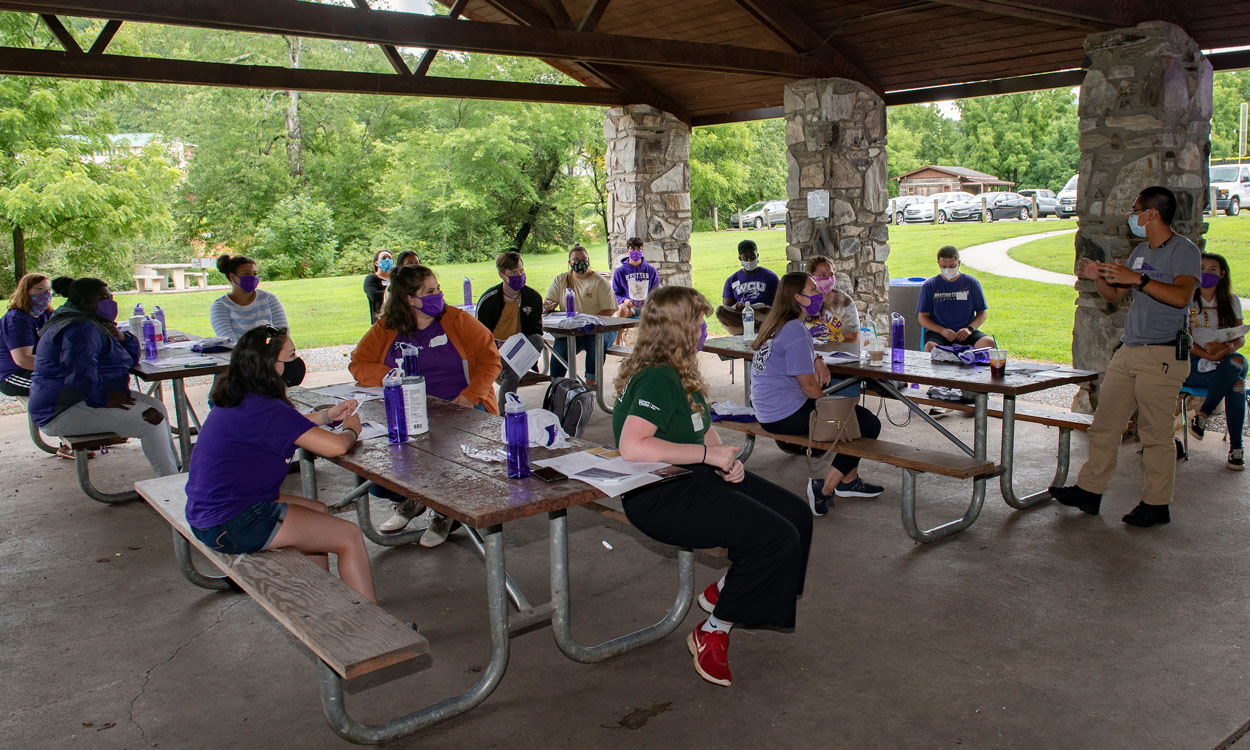Catamounts Care Ambassadors promote positive side of preventing pandemic spread
Catamounts Care Ambassadors participate in a pandemic preparedness mini course.
To encourage proper etiquette during a pandemic and help others adapt to the new normal on campus, a student-led program at Western Carolina University is using positive reinforcement to remind fellow students of strategies to help slow the spread of COVID-19.
A group of 21 undergraduates known as “Catamounts Care Ambassadors” will reward fellow students who “get caught” doing the right things for helping stop the coronavirus spread. They will distribute Catamounts Care stickers to recognize positive behavior, such as wearing face coverings, exercising proper physical distancing and other campus protocols. The stickers then can be converted into prizes. The ambassadors also will develop a social media effort and other programs designed to keep fellow students informed, including setting an example and positively reinforcing the Catamounts Care culture.
The effort is made possible through a $31,000 grant from a partnership with the University of North Carolina Asheville from funding provided by the North Carolina Policy Collaboratory to support healthy campuses during the pandemic. Each ambassador will receive a $1,350 educational stipend. “Catamounts Care” is the name given to the university initiative to help members of the campus community stay healthy.
“These students stepped up and stepped in to become a part of our campus solution,” said Lane Perry, executive director of WCU’s Center for Community Engagement and Service Learning. “We know that safe peer-to-peer communication and discussion is a highly effective way to disseminate information and encourage positive action.”
The wearing of face coverings in public settings, proper hand-washing or use of hand sanitizers, and physical distancing are important steps. Everyone returning to campus was given reusable cloth face coverings, a large container of sanitizing wipes, a refillable bottle of hand sanitizer, a thermometer and a copy of WCU pandemic standards.
“Serving as a Catamounts Care Ambassador has allowed me to continue to propel a culture of love, education and respect, rather than hate, on our beautiful campus, with our beautiful people,” said Daniel Tizon, a senior who also serves as director of community engagement for the Student Government Association and assistant chief of training with the WCU Emergency Medical Services. “Through positive reinforcement, our work creates ripples of hope that remind us that all of us are stronger than any one of us. Through taking ‘Catamount Pride’ seriously, together is how we will tackle the virus.”
Many of the student ambassadors completed the university’s pandemic preparedness mini course offered earlier this summer. They were among the nearly 60 participants made up of community members, faculty and staff who learned the history of pandemics, policy and its associated implications with COVID-19, health precaution basics, civic and community engagement and how to exemplify positive behavior. The mini course was taught by Kae Livsey, associate professor and director of community relations and scholarship for the School of Nursing; Patrick Baron, assistant professor and director of the Health Sciences Program; Amy Murphy-Nugen, associate professor of social work; and Perry.
“The mini course was a great success. Students, staff and faculty all engaged with the program we developed. Everyone, including myself, learned more about how to constructively engage our own community in order to promote health and prevent the avoidable negative consequences of this pandemic on our campus,” said Baron. “We hope the value of this kind of instruction is to raise awareness about the real issues we are confronting and to increase community preparedness by providing concrete, actionable information and models of positive roles and health-promoting behaviors for every community member. Personally, I aimed for every participant to come away with a better understanding of how interconnected our lives really are, for better or worse. We aimed to help inspire and enable a sense of collective responsibility for our mutual wellbeing.”
Moving forward, the Catamounts Care Ambassadors program will help to spread additional important information and messages and will be a vital part of the ongoing response to COVID-19, as it also develops new educational opportunities directed toward campus and the broader community in the future.
“I was reminded through the delivery and discussion of this course content that we fight fear, not only with a dose of faith, but with an IV of knowledge and research,” Perry said. “The more informed we are as members of our community the more likely positive behaviors and actions will beget more positive behaviors and actions. In turn, knowledge compounds faith and belief.”


